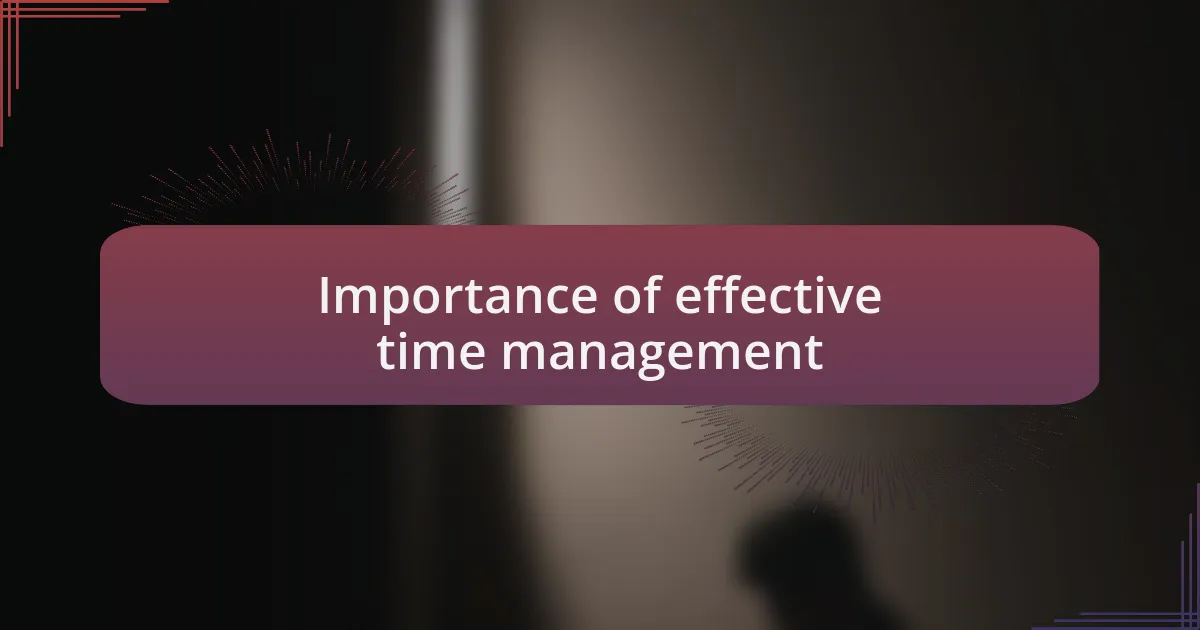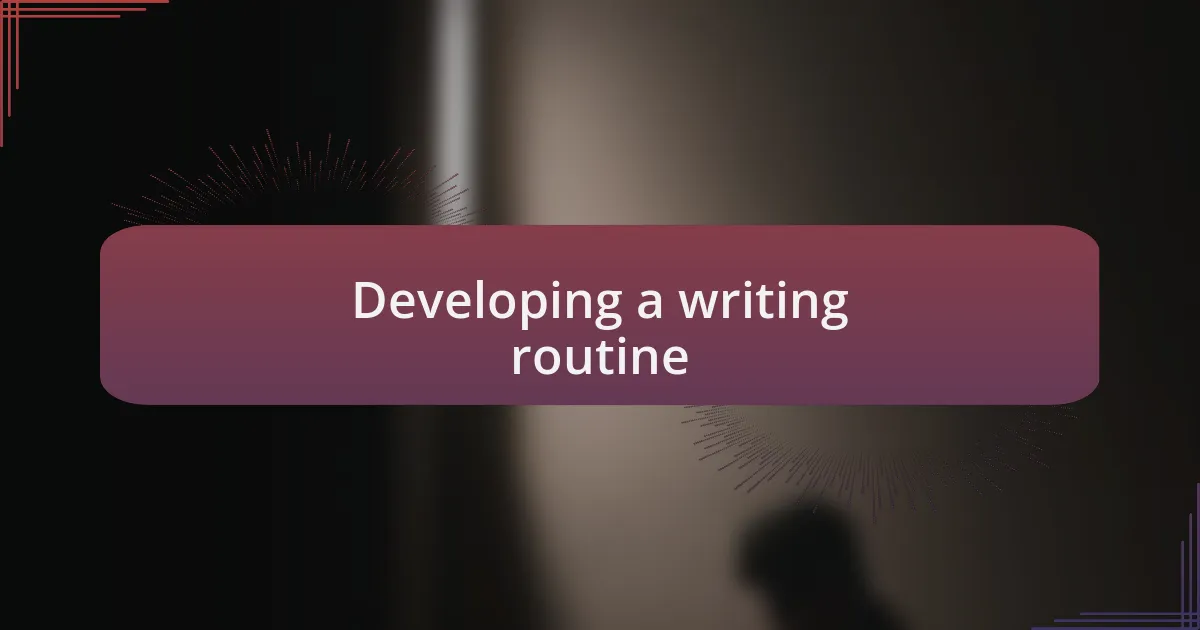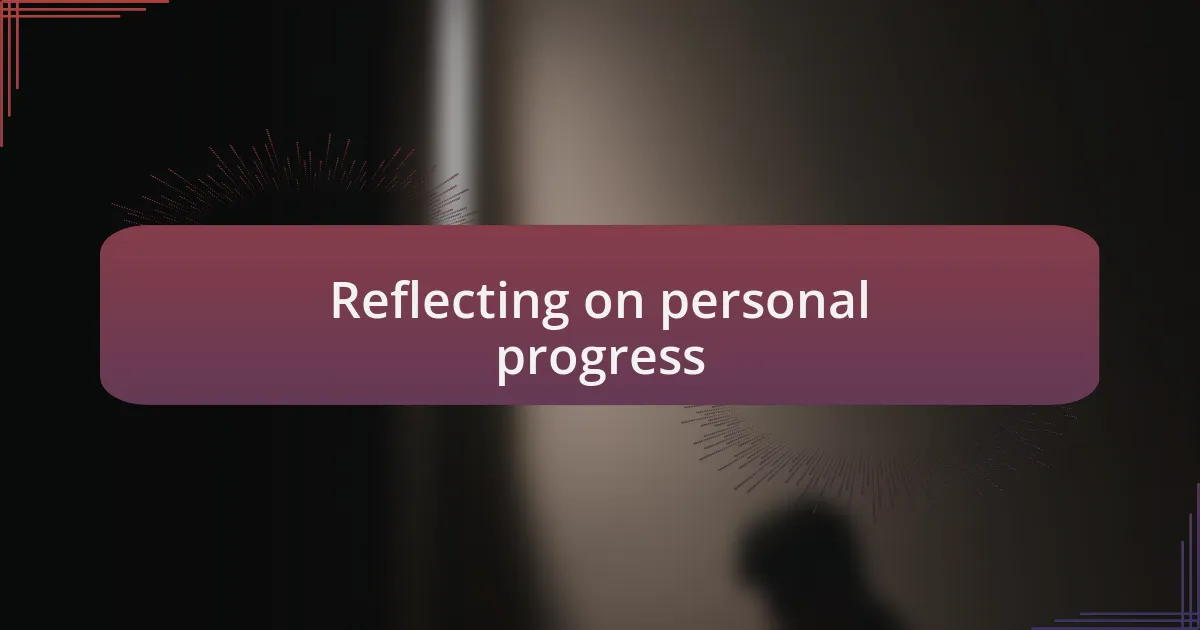Key takeaways:
- Finding a balance between writing and personal life is essential; setting boundaries can enhance creativity and relationships.
- Effective time management, through structured schedules, helps prioritize writing and personal time, improving both productivity and relationships.
- Establishing a dedicated writing space and leveraging technology enhances focus, organization, and the writing process.
- Reflecting on personal progress allows for recognition of growth and skills developed over time in writing, fostering motivation and resilience.

Understanding writing and life balance
Finding a balance between writing and life is like walking a tightrope. I often find myself reflecting on my own experiences—many late nights spent scribbling down ideas while missing a friend’s get-together. It’s a tough choice, and was it worth it? Sometimes I wonder if I should have let my pen rest to nurture those relationships.
When I write, I immerse myself in my thoughts, but I’ve learned that stepping away is just as crucial. I remember a weekend where I chose to unplug from writing and spent time in nature instead. That break rejuvenated my creativity and taught me that life experiences fuel my writing. Isn’t it interesting how those moments away from the page often spark the best ideas?
Balancing these two worlds can feel overwhelming. I often ask myself how I can create a routine that honors both my passion for writing and my desire for life experiences. I’ve started setting boundaries—dedicating specific hours for writing while reserving time for social engagements. This small strategy has transformed the way I approach each day, proving that a healthy writing-life balance is not only possible but essential for creative fulfillment.

Importance of effective time management
Effective time management is pivotal in coordinating writing and personal life. I recall a time I overcommitted myself, believing I could squeeze in an episode of my favorite series while writing. That night, instead of enjoying both, I found myself stressed and unproductive, scrambling to meet a deadline. It made me realize that without clear boundaries, the quality of my writing—and my leisure time—suffered.
When I started implementing structured time blocks, I noticed a remarkable shift. For instance, I often designated weekends for writing and weekday evenings for family. This not only gave my writing the focus it needed but also ensured I stayed present during family dinners. It’s amazing how just a few intentional hours can refine your output and enrich your personal relationships.
The heart of effective time management lies in knowing what truly matters to you. You might find yourself asking, “Where do my passions align?” For me, it became clear that setting priorities and being conscious of my schedule allowed me to live more fully. Balancing the demands of writing and life is not just about time; it’s about channeling your energy toward what nourishes your spirit.

Setting realistic writing goals
Setting realistic writing goals begins with self-awareness. I’ve often found myself setting lofty targets, thinking, “I can write a novel in a month!” However, after numerous late nights and overwhelming pressure, I learned that such ambitions can lead to burnout. Now, I assess my daily life responsibilities, talents, and time before committing to anything.
One effective strategy I adopted is to break larger projects into smaller, actionable tasks. For example, instead of saying, “I’ll finish a chapter this week,” I now set a goal to write for just 30 minutes each day. This makes the writing process feel more manageable and, honestly, less intimidating. I find that when I view my goals as tiny steps rather than giant leaps, I’m more likely to make consistent progress.
Reflecting on my journey, I realize that grace and patience are essential. How often do we forget that life can throw curveballs? There were periods when family obligations or personal challenges derailed my writing. Embracing a flexible mindset allowed me to adjust my expectations while still feeling accomplished. These moments have shown me that writing is not just about output; it’s also about growth and resilience.

Creating a dedicated writing space
Creating a dedicated writing space is one of the best decisions I’ve made for my writing routine. When I first started, I would write wherever I could – living room couch, kitchen table, even in the noisy coffee shop. It wasn’t until I carved out a small nook in my home, filled with my favorite books, a comfy chair, and soft lighting, that I truly felt like a writer. Isn’t it interesting how a specific environment can transform our mindset?
Setting up my writing space wasn’t just about the physical location; it became a sanctuary for my creativity. I learned the hard way that clutter and distractions hinder my flow. Now, I ensure my writing area is organized and inspiring. This intentionality helps me slip into writing mode more easily. Have you considered how your surroundings impact your thoughts and productivity?
I also discovered that adding personal touches makes the space feel welcoming. Photographs, quotes, and even the scent of a favorite candle can lift my spirits and spark inspiration. It’s unbelievable how these small elements can create a deeply personal atmosphere that nurtures my writing. What’s in your space that makes it uniquely yours?

Leveraging technology for writing
Digital tools have been a game-changer for my writing process. I remember the days when I relied solely on pen and paper, often wrestling with crossed-out sentences and eraser smudges. Once I started using writing software, not only could I easily organize my thoughts, but I also discovered features like spell check and formatting options that saved me time. Isn’t it incredible how a simple app can streamline the entire writing experience?
I also leverage online resources that foster creativity and collaboration. Just the other day, I shared a rough draft with fellow writers in an online community and received insightful feedback within hours. That instant connection and support reinvigorated my project. Have you ever tried seeking input from others online? It might just open doors to perspectives you hadn’t considered.
Moreover, I find that cloud storage has revolutionized the way I manage my work. Being able to access my writing from multiple devices means I can jot down ideas when inspiration strikes, whether I’m at home or out and about. One time, I was struck with a brilliant idea while waiting in line, and I was able to capture it instantly. How often do you miss those spontaneous bursts of creativity due to not having a pen nearby?

Developing a writing routine
Establishing a writing routine has been essential for my productivity. I’ve found that writing at the same time each day not only conditions my brain but also makes it easier to dive into my projects. I recall a period when I committed to writing every morning, and surprisingly, those early hours quickly became my favorite part of the day. Have you ever noticed how consistency can create a sense of comfort and anticipation?
Another key aspect is setting specific goals for each writing session. Initially, I would sit down without a clear focus, which often led to frustration. Now, I outline what I want to achieve—whether it’s completing a chapter or refining a paragraph. This approach has transformed my writing experience. When was the last time you defined small milestones that made your writing feel more tangible?
Finally, I’ve learned the importance of flexibility within my routine. Life happens, and sometimes I can’t stick to my planned schedule. I adjust by carrying a notebook or using my phone to jot down ideas when I’m away from my desk. Embracing this fluidity allows me to remain productive without feeling guilty about the times I can’t write as planned. How do you adapt your routine when life throws unexpected challenges your way?

Reflecting on personal progress
Reflecting on my personal progress has been a revelation. I remember when I used to measure success solely by the number of words written, but over time, I realized that growth comes from understanding my writing style and capabilities. Have you ever experienced that moment when you look back at your earlier work and feel a mix of pride and embarrassment? For me, it’s like rediscovering an old friend; I’ve evolved, but those beginnings still matter.
As I take a moment to reflect, I can see how specific challenges shaped my journey. For instance, revisiting a piece I struggled with months ago, I now recognize the skills I’ve developed since then. It’s invigorating to notice that areas where I once felt overwhelmed have become manageable, even enjoyable. How often do we give ourselves credit for the obstacles we’ve overcome, especially in a creative field?
Looking ahead, I find that tracking my progress fuels my motivation. I keep a journal where I jot down breakthroughs and lessons learned, which provides a sense of continuity I didn’t realize I needed. When has documenting your journey helped you appreciate your growth? For me, it’s a reminder that every setback holds a lesson, propelling me further in my writing endeavors.